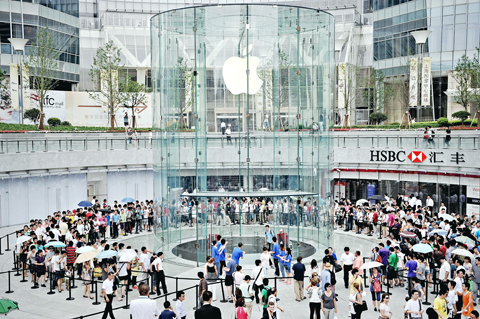Apple Inc opened its second China store yesterday as the maker of iPhones and iMacs seeks to catch rivals including Nokia Oyj and Lenovo Group Ltd (聯想集團) in the fastest-growing major economy.
Several hundred people lined up outside a 12.2m cylindrical glass wall that contains the Apple logo at the 1,500m² store in the Pudong district of Shanghai, China’s financial hub, before it opened at 10am local time.

PHOTO: AFP
“Apple stands for a lifestyle,” said a 27-year-old salesman who called himself “Penguin,” from the northern Chinese province of Jilin, more than 2,000km from Shanghai. He waited as the first in the queues for almost 70 hours.
Apple is expanding its network to reach more customers in China, where its sales trail Nokia and Lenovo, and said this week it plans “many” more Apple stores for China. The company’s first China store opened in Beijing in July 2008.
The products are “quite special,” said Zhu Chenqi, a 23-year-old administrative secretary who has spent 30,000 yuan (US$4,430) to 40,000 yuan on Apple products. “In the first place you would be caught by its look and then you would be impressed by its easy applications.”
While the store attracts a variety of customers from teenagers to grandfathers, most visitors are well-dressed and in their 20s and 30s, like most of the 175 vendors at Shanghai Apple.
More than 80 percent of the vendors have university degrees and some of them were lawyers and teachers, local media reported.
Unlicensed distributors sold more than 2 million iPhones on a so-called gray market, according to Sandy Shen (沈哲怡), an analyst at Gartner Inc in Shanghai. China Unicom (Hong Kong) Ltd (中國聯通), the only authorized Chinese carrier offering the smartphone, sold fewer than 1 million, she said.
“The conditions are not in place for Apple in China at the moment, as it doesn’t have the sales channels and distribution,” said Aloysius Choong, an analyst at research firm IDC in Singapore. “The reports of the gray market activities for Apple’s products in China show there is good inherent demand for them.”
The iPhone 3GS, Apple’s top model, sells for 6,999 yuan in China Unicom’s stores, according to the carrier’s Web site. Chinese consumers can buy the smartphone for less from gray market vendors, Shen said. The same model costs US$299 with an AT&T Inc plan in Apple’s online store in the US.
Smartphone shipments may increase 50 percent to 26 million this year in China, where Nokia is the market leader, Choong said. Lenovo is the biggest personal-computer maker in China, according to IDC data.

The Eurovision Song Contest has seen a surge in punter interest at the bookmakers, becoming a major betting event, experts said ahead of last night’s giant glamfest in Basel. “Eurovision has quietly become one of the biggest betting events of the year,” said Tomi Huttunen, senior manager of the Online Computer Finland (OCS) betting and casino platform. Betting sites have long been used to gauge which way voters might be leaning ahead of the world’s biggest televised live music event. However, bookmakers highlight a huge increase in engagement in recent years — and this year in particular. “We’ve already passed 2023’s total activity and

BIG BUCKS: Chairman Wei is expected to receive NT$34.12 million on a proposed NT$5 cash dividend plan, while the National Development Fund would get NT$8.27 billion Taiwan Semiconductor Manufacturing Co (TSMC, 台積電), the world’s largest contract chipmaker, yesterday announced that its board of directors approved US$15.25 billion in capital appropriations for long-term expansion to meet growing demand. The funds are to be used for installing advanced technology and packaging capacity, expanding mature and specialty technology, and constructing fabs with facility systems, TSMC said in a statement. The board also approved a proposal to distribute a NT$5 cash dividend per share, based on first-quarter earnings per share of NT$13.94, it said. That surpasses the NT$4.50 dividend for the fourth quarter of last year. TSMC has said that while it is eager

‘IMMENSE SWAY’: The top 50 companies, based on market cap, shape everything from technology to consumer trends, advisory firm Visual Capitalist said Taiwan Semiconductor Manufacturing Co (TSMC, 台積電) was ranked the 10th-most valuable company globally this year, market information advisory firm Visual Capitalist said. TSMC sat on a market cap of about US$915 billion as of Monday last week, making it the 10th-most valuable company in the world and No. 1 in Asia, the publisher said in its “50 Most Valuable Companies in the World” list. Visual Capitalist described TSMC as the world’s largest dedicated semiconductor foundry operator that rolls out chips for major tech names such as US consumer electronics brand Apple Inc, and artificial intelligence (AI) chip designers Nvidia Corp and Advanced

Pegatron Corp (和碩), an iPhone assembler for Apple Inc, is to spend NT$5.64 billion (US$186.82 million) to acquire HTC Corp’s (宏達電) factories in Taoyuan and invest NT$578.57 million in its India subsidiary to expand manufacturing capacity, after its board approved the plans on Wednesday. The Taoyuan factories would expand production of consumer electronics, and communication and computing devices, while the India investment would boost production of communications devices and possibly automotive electronics later, a Pegatron official told the Taipei Times by telephone yesterday. Pegatron expects to complete the Taoyuan factory transaction in the third quarter, said the official, who declined to be